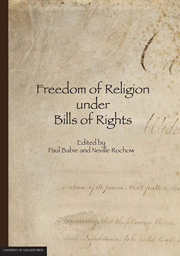Book contents
- Frontmatter
- Contents
- Acknowledgments
- List of Contributors
- Foreword by The Hon Sir Anthony Mason AC KBE: Human Rights and Courts
- INTRODUCTION
- SETTING THE SCENE
- CONTEMPORARY FREEDOM OF RELIGION ISSUES
- COMPARATIVE EXPERIENCE WITH FREEDOM OF RELIGION
- 9 Political Culture and Freedom of Conscience: A Case Study of Austria
- 10 The Sky is Falling if Judges Decide Religious Controversies! – Or is it? The German Experience of Religious Freedom Under a Bill of Rights
- 11 Religious Freedom in a Secular Society: The Case of the Islamic Headscarf in France
- 12 Religious Freedom in the UK after the Human Rights Act 1998
- 13 Judicial Interpretation, Neutrality and the US Bill of Rights
- 14 Protecting Religious Freedom: Two Counterintuitive Dialectics in US Free Exercise Jurisprudence
- 15 Walking the Tightrope: The Struggle of Canadian Courts to Define Freedom of Religion under the Canadian Charter of Rights and Freedoms
- 16 Quo Vadis The Free Exercise of Religion? The Diminishment of Student Religious Expression in US Public Schools
- 17 Freedom from Discrimination on the Basis of Religion
- 18 Ruminations from the Shaky Isles on Religious Freedom in the Bill of Rights Era
- 19 Indigenous Peoples and Bills of Rights
- TABLE OF LEGISLATION AND INTERNATIONAL INSTRUMENTS
- INDEX
14 - Protecting Religious Freedom: Two Counterintuitive Dialectics in US Free Exercise Jurisprudence
from COMPARATIVE EXPERIENCE WITH FREEDOM OF RELIGION
Published online by Cambridge University Press: 05 June 2013
- Frontmatter
- Contents
- Acknowledgments
- List of Contributors
- Foreword by The Hon Sir Anthony Mason AC KBE: Human Rights and Courts
- INTRODUCTION
- SETTING THE SCENE
- CONTEMPORARY FREEDOM OF RELIGION ISSUES
- COMPARATIVE EXPERIENCE WITH FREEDOM OF RELIGION
- 9 Political Culture and Freedom of Conscience: A Case Study of Austria
- 10 The Sky is Falling if Judges Decide Religious Controversies! – Or is it? The German Experience of Religious Freedom Under a Bill of Rights
- 11 Religious Freedom in a Secular Society: The Case of the Islamic Headscarf in France
- 12 Religious Freedom in the UK after the Human Rights Act 1998
- 13 Judicial Interpretation, Neutrality and the US Bill of Rights
- 14 Protecting Religious Freedom: Two Counterintuitive Dialectics in US Free Exercise Jurisprudence
- 15 Walking the Tightrope: The Struggle of Canadian Courts to Define Freedom of Religion under the Canadian Charter of Rights and Freedoms
- 16 Quo Vadis The Free Exercise of Religion? The Diminishment of Student Religious Expression in US Public Schools
- 17 Freedom from Discrimination on the Basis of Religion
- 18 Ruminations from the Shaky Isles on Religious Freedom in the Bill of Rights Era
- 19 Indigenous Peoples and Bills of Rights
- TABLE OF LEGISLATION AND INTERNATIONAL INSTRUMENTS
- INDEX
Summary
This chapter focuses on what is usually described in the United States as the problem of religious exemptions. Imagine that you have religious reasons for resisting the requirements of a state or federal law. Perhaps you are a conscientious objector to military service, having religious (or philosophical) grounds against taking up arms. Perhaps you are a member of a church that uses peyote or other banned substances in your sacramental rituals. Perhaps you seek an exemption from having to work on Saturday, your Sabbath. How does — and how should — the law go about determining whether or not you are entitled to an exemption from generally applicable laws?
From the perspective of equality, an exemption may not be warranted, if the law treats everyone the same, with perhaps the additional requirement that the law, even though it appears general and neutral on its face, was written to specifically target a particular set of unpopular religious beliefs. From the perspective of liberty, an exemption might be warranted, as long as the burdens on religious exercise are real and the burdens on the state for accommodating the religious exemption are not unduly onerous. The problems of balancing the individual's interest in an exemption against the state's interest in enforcing its laws may be difficult, but this is a type of analysis with which the law is familiar and adept.
Thus, one important question will be whether we see the question of exemptions as presenting a problem that should be viewed primarily through the prism of equality, or through the prism of freedom. In most situations, freedom and equality will both be present as values a court will acknowledge, but it may be that one of these values takes precedence.
- Type
- Chapter
- Information
- Freedom of Religion under Bills of Rights , pp. 285 - 320Publisher: The University of Adelaide PressPrint publication year: 2012



